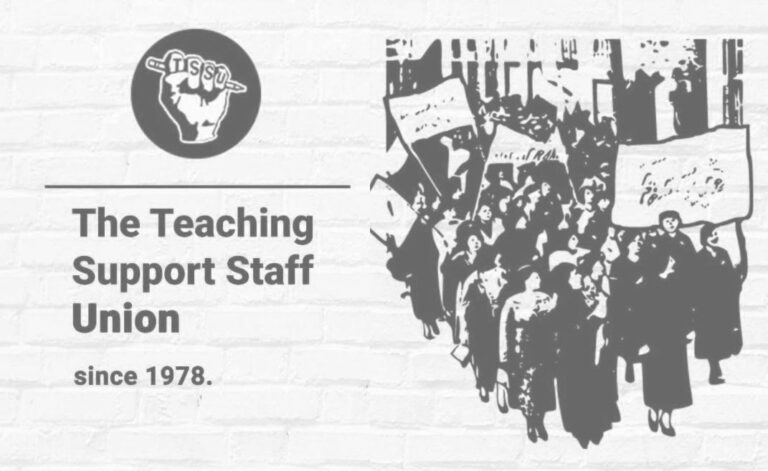Inspiration - Why Should I Care about the BOG Meeting Tomorrow?


Speech delivered by TSSU member
Myka Tucker-Abramson to the Board of Governors' Finance Commitee Meeting earlier this week:
Good morning. My name is Myka Abramson and it's my privilege to speak
to you this morning on behalf of the SFU community coalition. Before
I begin talking to you about the budget, I just wanted to introduce
you briefly to the coalition and where we come from. We are a group
of students, staff, and faculty who came together in light of the recent
funding crisis in the post-secondary education sector. Initially we
formed around the most recent Liberal budget to organize a spectacularly
successful rally, which drew over 1000 people to call on the government
to live up to its commitment to public education. After the budget came
out, we realized both that a number of our concerns hadn't been dealt
with and that there was a huge interest on campus in continuing to build
momentum in the fight for public education, and it is this momentum
and this shared commitment that brings us here today.
The community coalition brings together the Simon Fraser Student Society,
the Graduate Student Society, the Teaching Support Staff Union, the
SFU Faculty Association, the Administrative and Professional
Staff Association, the members of CUPE 3933 and 5938 which represent
the support staff of SFU and the SFSS, and Polyparty. Because there
are so many of us and because we are aware of the serious constraints
of your time, we have limited our speakers to two. Myself personally,
I'm a graduate student and a teaching assistant, and so I will be speaking
to you on behalf of the concerns of the GSS, TSSU, and SFSS. Michael
Ling will be speaking to you on behalf of the faculty and staff groups.
I am here because I have been at this
institution for four years now and am deeply committed to the values
and quality of education SFU offers, but I am also here because I have
serious concerns about what the recent economic crisis will mean for
this institution. I have seen the provincial budget and am all too aware
of how dire the situation is and how difficult the crafting of this
budget must have been for you, but I am also deeply worried about the
implications that this budget, which is fundamentally a coping budget,
will mean for our community. While it is one thing to talk about the
need for rationalization, for constraint, and for innovation, it is
another thing to think about what on-the-ground impacts these policies
will have, and what I am here to ask you to think about when considering
this budget and budgets in the future, is the hidden costs in this budget--the
costs that aren't mentioned, and those are the financial costs, the
human costs, and the costs to Simon Fraser's reputation.
Essentially, what I'm here to say is that, as you know all too well,
in the university sector, reputation is capital and what we want to
show today is that in the long term it is actually far more expensive
to repair a reputation damaged by years of under-funding than to invest
in education and in our reputation. We also are here to talk about how
interconnected every budget item is and how deep the impacts of these
cuts will be on Simon Fraser University.
I just want to give one example that comes from my own experience as
a graduate student and a teaching assistant. I actually initially began
my PhD in New York and ended up coming back here to complete it because
I realized the quality of education here was so superior and
what made it superior was the mentorship and time faculty would spend
with us, the intellectual community, and the experience teaching with
my fellow graduate students, and so I was deeply relieved to hear President
Michael Stevenson talk about his commitment to graduate funding and
research funding in spite of the huge economic pressures facing this
institution. My understanding was that this commitment came from his
understanding that so much of the reputation of post secondary institutions
rests with the quality of the research being produced by the faculty
and graduate students.
However, what we are seeing on the ground as a result of this budget
is a very different story, and in fact constitutes a large attack on
the graduate population. What we have been hearing from President Stevenson,
from Department Chairs and from our Union reps within individual departments
is that the budgets for TAships and Sessionals are being slashed, while
at the same time fellowships are either being cut in half or severely
reduced.
Everything is interconnected, and even putting aside the issue of staff
and faculty cuts, what these attacks on graduate funding mean is two-fold.
First is that with fewer TAs, tutorials will have way more students
if tutorials are even offered, and as someone who has worked as a TA
for the last 4 years, one of the amazing things that happens is that
we really get to watch students grow and develop; we get to work fairly
intimately with them in developing their ideas, their writing skills,
and in building community and relationships between them. With higher
class sizes, that opportunity for dialogue and development is deeply
compromised and even scarier is the possibility of there being no tutorials
and thus no time for students to develop ideas or relationships with
each other. It would be one thing if classes were set at 30, but as
this budget says, lecture sizes are also going up, and this means students
are increasingly alienated from their education. As you know all too
well, class size is one of the number one things surveys like Macleans
and the Globe and Mail look at and in fact, our class sizes are
already well above the national average and this means we are looking
worse and worse to these polls. Reputation is capital, and the raising
of class sizes will hurt that reputation in very profound ways.
Second is that graduate students depend on TAships, Sessional positions,
and fellowships for most of their funding. As access to fellowships
decrease, students start having to compete for TAships or Sessional
jobs, and once those vanish, students are essentially left without any
way to support themselves. In Psychology alone, we have lost 25 TA positions,
and as Michael Stevenson said at his talk, as we increasingly lose money,
the entire structure of SFU might change. He brought up the possibilities
of increased on-line learning, of turning Teaching Assistantships into
Co-op positions, and of replacing teaching hours with volunteer programs.
And one of the inconsistencies that we're seeing in the budget, and
in conversations more broadly, is that there is on the one hand a verbal
commitment to grad studies and graduate students, and on the other hand,
there is a constant cutting away of the meat and potatoes of graduate
funding.
In Canada and the US, Graduate funding is competitive, and a lot of
our award winning students are being courted by other schools, and if
we cannot fund them to be here, we will lose them, and again, graduate
students are some of the most prominent faces, which represent a University.
We are the ones out there innovating new ideas, publishing, going to
conferences, connecting with other schools, but all of these things
are only possible if we are properly funded. Otherwise, unfortunately,
we risk losing students to a university that can fund them, and we risk
creating a graduate faculty based solely on those with money, not with
talent, passion, and brains. Back to my own return to SFU, I was lucky
that I had external funding from SSHRC so I could afford to give up
a $20 000/year scholarship in New York to come back here, but without
that funding, I wouldn't have been able to return. And I say this as
someone who is lucky enough to have access to stable TAships--what happens
when people don't even have that? There are tons of other stories. I
have a friend who is trying to support a wife and kids on a TAs salary
and has had to take another job to make ends meet. How is he supposed
to publish, research, or attend conferences when he has to work 30 hours
just to get by?
And this is also happening for undergrads with the cuts to financial
support. Many of our best, brightest, and most successful students are
working class students who would be unable to attend school without
this necessary support. One of the first things I ask my students now
is how many of them work, and it seems like every semester the number
of students I have who are living at home with their parents and working
close to full time is going up. I am troubled that as tuition increases,
so do class sizes. In other words, we are asking people to pay more
money for less education. People just cannot afford the rising tuition
and those who do excel find themselves forced to go elsewhere, where
schools can put money on the table. So again what we see is the development
of a slow, steady brain drain away from our campus.
We are talking about reputation here, and capacity for research, but
we're talking about people's lives. It's pretty unheard of at SFU for
faculty, staff, and students to come together, but as you've seen in
the phenomenally successful 1,100 person rally we held in February,
the petition which over 1,000 people signed, the well-attended educational
forum in March, and our planned attendance at the Board of Governors
Meeting on Thursday, our campus community is really growing, and we're
growing because of our deep commitment to this institution, but also
to each other as people, and because we're terrified of what this budget
means for SFU, and for all of us as members of that community and what
we're asking you to listen to as you consider this budget and future
ones, are the enormous hidden costs that a coping budget will have on
our reputation, on our finances, and on the people who make up this
important community.
Thank you.
